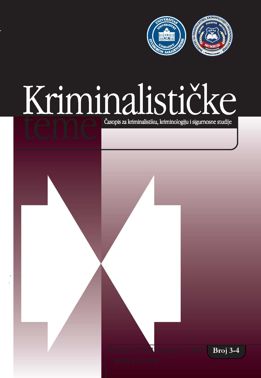MORFOLOGIJA NEPRAVILNOSTI U IZVRŠENJU BUDŽETA I FINANSIJSKIM IZVJEŠTAJIMA, KORIŠTENJU RESURSA I UPRAVLJANJU DRŽAVNOM IMOVINOM U FEDERACIJI BOSNE I HERCEGOVINE
SCOPE AND FORMS OF IRREGULARITIES IN BUDGET EXECUTION AND THE FINANCIAL STATEMENTS, THE USE OF RESOURCES AND THE MANAGEMENT OF STATE PROPERTY BY THE PUBLIC INSTITUTIONS IN FEDERATION OF BOSNIA AND HERZEGOVINA
Author(s): Darko Datzer, Eldan Mujanović, Elvir Sinanović, Nebojša BojanićSubject(s): Public Administration, Criminology, Fiscal Politics / Budgeting, Corruption - Transparency - Anti-Corruption
Published by: Fakultet za kriminalistiku, kriminologiju i sigurnosne studije Univerziteta u Sarajevu
Keywords: corruption; irregularities in budget execution and the financial statements; the use of resources and the management of state property; public administration;
Summary/Abstract: Reason for writing and research problem(s): Successful fight against corruption requires sound approximation of corruption prevalence. It is no easy task and it is burdened with various difficulties; these are immanent in measurement of crime in general, but abuses of official duties, which corruption refers to, poses a particularly complex issue. Typical corruption measures are subjective and largely influenced by immediate social and political circumstances. Aims of the paper (scientific and/ or social): This paper seeks to review publicly available (external) audit reports in Federation of Bosnia and Herzegovina in order to describe the scope and forms in which irregularities in budget execution and the financial statements, the use of resources and the management of state property by the public institutions in Federation of Bosnia and Herzegovina, which can be associated with corruption, are present in public sector. Results can be used in development of more focused anti-corruption policies in public sector of Federation of Bosnia and Herzegovina. Methodology/ Design: The research uses cross-sectional descriptive design in examining forms of corruption, resting on data available in Audit office for the institutions of the Federation BiH's official reports. Content structuring, a qualitative content analysis technique, was utilized, whereby categorization was inspired by relevant international audit standards. Research/ Paper limitation: Identification of practices associated with the corruption is based on financial and performance audit standards. Not all activities associated with the corruption are equally prone to detection by the audit process, whose result- audit report, might also reflect the priorities in the work of the audit institution rather than real weaknesses and irregularities in audit subjects. Inferences made in the paper are also limited by the fact that they rest on single data source, which is considered to provide only indefinite corruption picture. Results/Findings: The findings suggest that irregularities associated with the corruption in federal public sector are, unsurprisingly, greatly present. There were 14irregularities per audit subject, referring mainly to the material costs, costs of employees and services, miscarriages in allocation, spending and oversight of funds, irregularities in public procurement processes, and to a smaller degree to public sector appointments and recruitment and participation in the work of various boards. General Conclusion: As expected, the scope and forms of corruption-associated activities identified in the paper indicate on many irregularities in public sector of Federation of Bosnia and Herzegovina. In order to gain a more comprehensive picture on country`s corruption profile it is necessary to use multiple, complementary measurement tools which would combine both subjective and objective indicators. Fight against corruption requires consistent further activities of all relevant actors, in which political will and readiness of government to develop proper institutional capacities linked to it are of crucial importance.
Journal: Kriminalističke teme – Časopis za kriminalistiku, kriminologiju i sigurnosne studije
- Issue Year: XVIII/2018
- Issue No: 3-4
- Page Range: 1-28
- Page Count: 28
- Language: Bosnian, Croatian, Serbian

